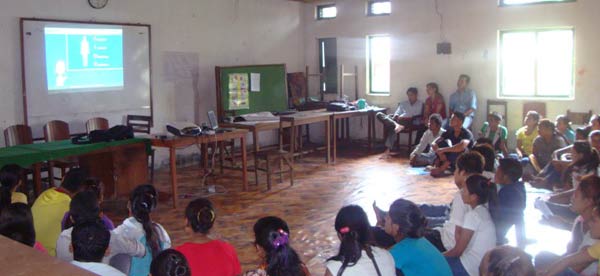TeachAids supplements NGO health program for young Bhutanese refugees in Nepal
The southeastern region of Nepal is home to thousands of refugees from Bhutan who live with limited access to resources. The non-governmental organization, Association of Medical Doctors of Asia – Nepal (AMDA-Nepal), is working to meet the needs of underprivileged and marginalized populations in Nepal by promoting health and well-being. In May 2012, AMDA-Nepal, in collaboration with the Office of the United Nations High Commissioner for Refugees (UNHCR), partnered with TeachAids to provide HIV education to young refugees from Bhutan during their health seminars. This activity highlights AMDA-Nepal’s commitment to their motto: better quality of life for a better future.
Bhutan is a mountainous, landlocked country in the heart of South Asia composed of several ethnic groups, including the Lhotshampa people of Nepali origin who settled in the south during the late 19th century. During the mid-1980s, thousands of Lhotshampas sought refuge in neighboring India and Nepal. By 1992, UNHCR had established seven refugee camps in southeastern Nepal to accommodate these Bhutanese men, women, and children. Today, Nepal is still host to thousands of refugees and asylum seekers who are predominately from Bhutan. Despite resettlement programs, approximately 60,000 refugees still remain in Nepal.
In 2001, AMDA-Nepal partnered with UNHCR to provide primary healthcare, immunizations, 24-hour emergency medical response, health education, and nutrition services to refugees still living in camps near the Bhutanese border. Charged with such critical and broad responsibilities, AMDA-Nepal has focused on providing preventive care programs to ensure the health and well-being of the community. Although the incidence of HIV in the camps is thought to be low (less than 0.5%), young refugees are vulnerable to transmission due to migratory labor patterns and increasing rates of injection drug use and commercial sex work.
Recently, AMDA-Nepal HIV Program Officers shared the TeachAids software with nearly 75 young refugees and host community members during a health seminar on basic HIV and AIDS education. Due to its warm reception, AMDA HIV Program Officer, Kiran Bam, plans to expand their use of TeachAids to reach larger audiences.
Previously, the English and Hindi TeachAids tutorials were aired twice on a popular Tibetan cable television station, and posted on TibetOnlineTV as well as used by Humanitarian Efforts Reaching Out (HERO) to educate Tibetan refugees, demonstrating tremendous effort in the South Asia region to combat the spread of HIV and empower refugees.
TeachAids is honored to support the humanitarian efforts of the Association of Medical Doctors of Asia – Nepal and the Office of the United Nations High Commissioner for Refugees. We look forward to our continuing partnership to increase the level of HIV awareness and education among the displaced people they serve.
Photo: Association of Medical Doctors of Asia – Nepal shares TeachAids tutorial with young refugees and host community members.
